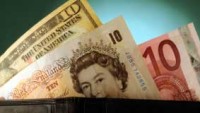 The pound swung wildly on Tuesday as news emerged that the British Prime Minister, Theresa May, will call an early general election on June 8. The announcement took markets by surprise as May had previously ruled out an election before 2020, and most analysts had expected that any decision for a snap election would have come before the triggering of Article 50 and not after it.
The pound swung wildly on Tuesday as news emerged that the British Prime Minister, Theresa May, will call an early general election on June 8. The announcement took markets by surprise as May had previously ruled out an election before 2020, and most analysts had expected that any decision for a snap election would have come before the triggering of Article 50 and not after it.
The UK government formally notified its intention of withdrawing from the European Union on March 29 – a move that is considered irreversible and comes nine months after the shock ‘leave’ vote from the EU in/out referendum. As preparations for the Brexit negotiations get underway, Mrs. May has seen a window of opportunity to end the uncertainty surrounding the timing of the next election and to enter talks with the EU with a strengthened hand.
May’s Conservative party are currently ahead in the polls with around a 20-point lead over the Labour party, which have been struggling under the leadership of Jeremy Corbyn. The polls put Theresa May in a strong position to win the general election in June with an increased majority in the House of Commons. A bigger majority would weaken the opposition, as well as silence pro-EU party rebels, and make it easier for the government to pass Brexit-related legislations. Early elections would also legitimise May’s premiership as the former Home Secretary was voted in by party members after David Cameron’s resignation and not by the public.
The British currency initially fell sharply in a knee-jerk reaction to the reports that the prime minister is due to make an important statement. Sterling dropped to 1.2514 dollars before rebounding dramatically to a 4-month high of 1.2714 dollars after May’s announcement. The positive market response is an indication that investors are confident that May will win the election in less than two months’ time, which should help create political stability at a time of great uncertainty about Britain’s future trading relationship with the EU and the rest of the world. Some investors are also hoping that a strong win for May would allow the prime minister to follow her own agenda and make her less inclined to listen to the hardliners within her own party that are demanding a clean break from the EU after Brexit.
The President of the European Council, Donald Tusk, responded by saying the UK election will not change the Brexit timetable. EU leaders are due to meet on April 29 to discuss and form a common EU strategy to the Brexit negotiations, with many of them suggesting that the talks will likely take longer than the stated two years.

Origin: XM












